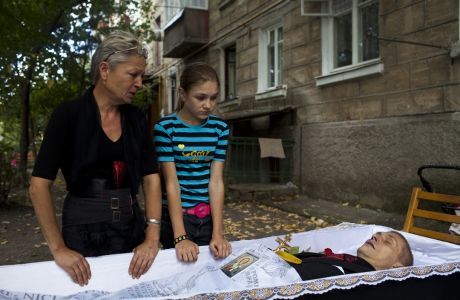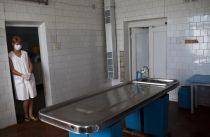Dumitru Stupalov's body arrived to the morgue on a Thursday, the same day he died. His autopsy was performed on Friday morning. He had spent several months at the TB Hospital in Balti battling MDR-TB under the supervision of Dr. Pablo Cioabnu. Ciobanu was on hand during the autopsy and explained that in Moldova, practically every death results in at least a cursory autopsy and, that in the case of TB patients, the attending doctor is asked to come to inspect the infected organs and confirm the diagnosis and cause of death. Dumitru was also living with HIV, which Ciobanu said significantly complicated his MDR-TB treatment. The autopsy confirmed that the TB had not only damaged his lungs, but had spread to other organs as well.
Dumitru Stupalov had spent time in prison for a drug offense. Vladimir Stupalov, Dumitru's father and a former prisoner himself, is sure that his son was infected with TB while in jail. According to statistics kept by Moldova's Department of Penetentiary Institutions and confirmed by a local NGO that works in the prisons, the TB rate in Moldova's jails is currently at about the rate that the World Health Organization(WHO) defines as an epidemic. Still, the prisons have seen a drastic reduction, as much as 700 percent, in their TB rate over the past 10 years. This drop is the result of the implementation of various measures, including isolating infectious prisoners and following the DOTS treatment strategy, which is endorsed by the WHO. It is entirely possible, in fact likely, that Dumitru got TB while in prison, thoughTB is so prevalent in Moldova that it is impossible to know for sure.
After Dumitru's autopsy, his father picked up his body and took it to the apartment where the family lived together. Typically, in Moldova, the body would be laid out inside the apartment in an event similar to a wake, giving friends and family an opporuntity to visit and say goodbye. The Stupalov family shared a very small apartment,- five of them slept in a eight by twelve foot room with three beds- that was too small to fit the coffin, so they laid the coffin on two chairs in front of the apartment building's porch. A few dozen friends and neighbors came to support the family, while others who lived in the nearby building simply walked through the wake on their way home. For a family with a member who was infected with MDR-TB, their living situation was potentially a very dangerous one. Living and sleeping in such tight quarters increases the possibility of other family members could contract the disease. Unfortunately, this is the reality for many families in Moldova because of the dire economic limitations that they face.
After the wake, the family took Dumitru's body to his grandmother's home in Maiskoe, a small village where he gew up, about 30 kilometers from the city of Balti. The funeral would be the next day, and until then they would hold a wake for the residents of Maisoke who wanted to pay their respects. When I arrived on Saturday morning for the funeral, Valdimir, Dumitru's father, told me that the body, which was not embalmed, had already begun to turn color. You could smell the body upon entering the house and, once the funeral began, his mother tirelessly swatted flies away from her son's face with a few wilted, yellow roses.
Dumitru's life was filled with many of the risk factors that can make it much more likely for a person to develop active TB, as well as complicate treatment: he lived in poverty, used drugs, was co-infected with HIV and spent time in prison. His life - and death - are not only examples of the human tragedies that TB causes, but also of the complex set of social situations that make TB an incredibly difficult disease to prevent and treat.



